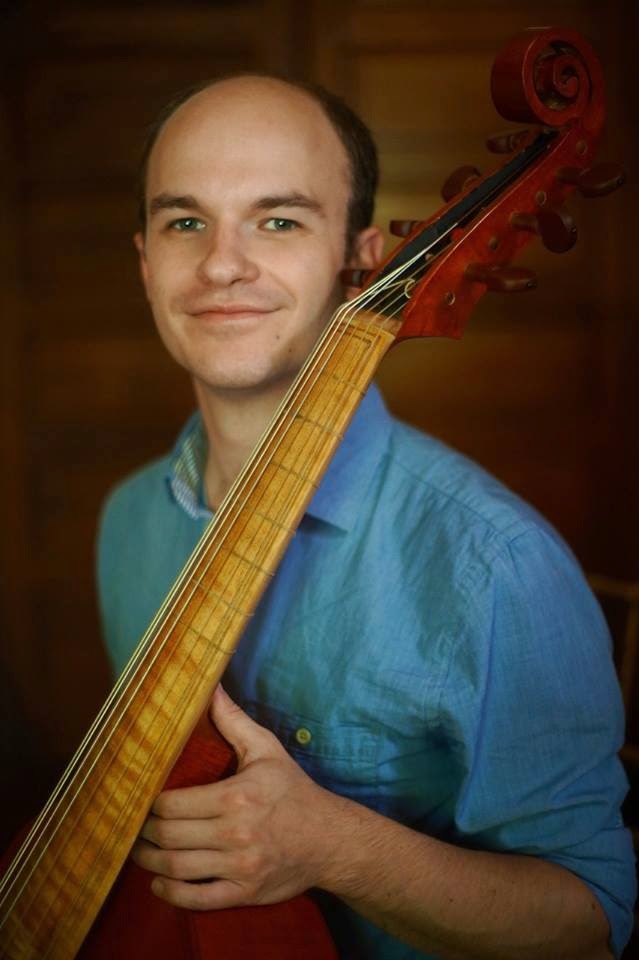This
spring Catacoustic will award its 5th Annual Early Music
Scholarship. Here’s a check in with our
past award winners:
Way
back in 2011, our first winner was Elizabeth Motter. An accomplished professional harpist,
Elizabeth was interested in taking on the Baroque triple harp. It turns out the difference between a modern
pedal harp and the Baroque triple harp is substantial. She began her journey at the Accademia
d’Amore in Seattle, courtesy of the Catacoustic scholarship. Since then she has attended Tafelmusik and
Oberlin’s Baroque Performance Institute, and had coaching with a variety of
continuo players. It’s been a real
challenge, but the work has been paying off. Elizabeth has played now with University of Cincinnati
College-Conservatory of Music in several Monteverdi projects,
in Minneapolis with Consortium Carissimi, with Catacoustic (including two concerts this season), and for
Cincinnati Opera’s presentation of La
Calisto. Here’s how Elizabeth sums
up her growing involvement with early music in Cincinnati:
“I
consider myself fortunate to have people here in Cincinnati to play baroque
music with, and a community of baroque-curious, with whom to learn, such as the
many singers from CCM who have agreed to do various
projects for free in exchange for coaching. And slowly the community here is
growing, as a result. It is important to have a community of people to actually
play with. I have heard from baroque harp players in other cities that they
don't have people to collaborate with on a regular basis, that there is no
local early music community, so I am extremely grateful to be in a place that
offers such opportunities.”
Our second award, in 2012, was given to Micah Fusselman, enabling
him to purchase his own viola da gamba. Micah has since moved to Omaha, Nebraska, where he is teaching viol to
four adult students and several children. They are on the brink of beginning to
play in consort with each other—quite an achievement after less than two
years!
Micah
also plays himself, of course, including an upcoming series of Bach Gamba
Sonatas. He also loves playing with his students. “I've been using
the gamba quite a lot working with my cello and violin students, actually. I've
learned to play bass lines and realize continuo at the same time so that I can
accompany various 17th and 18th-century sonatas. It's a real challenge for me,
but it works very nicely in some pieces and the students learn a lot about the
style. My students have become so accustomed to me accompanying on the viol
that they never mention it anymore. It's funny when a new student shows up to a
group class and sees the gamba for the first time, is amazed and aghast, and my
other students calmly give him or her the rundown.” What a delight to think
that a community of early music-savvy people is coming up in Omaha, and
Catacoustic had a hand in the making of it!
The award in 2013 went to Michael Zaret. Michael was once a professional recorder
player (his
group, Musica Camerata, toured, and even performed on “A Prairie
Home Companion”.) Over the years that had
slipped into the background. But there
came a time when he realized he was ready to get back to playing. His lovely collection of recorders was
showing the years of neglect: the
scholarship allowed him to have them refurbished and returned to performance
quality. And because a talented recorder
player is always in demand, Michael has become a sought-after member of many
groups around town.
Michael plays regularly with Consort in the Egg, which features
mostly wind instruments and very early Renaissance music (playing Feb 10 at Live at Lunch at Christ Church Cathedral); Cincinnati Recorder
Consort, which combines pros and amateurs and explores all kinds of repertoire;
Noyse Merchants, which specializes in authentic instruments and Renaissance
music; and sometimes he sits in with Ubi Caritas, a Baroque wind band. He is also active in several pick-up groups. His motto is essentially “Will Play for Fun.” He’s branching out into the worlds of Baroque
flute, cornettino, and cornamuse. Michael’s day job is as a teacher at Skyward Academy, where he teaches junior and high-school
kids on the autism spectrum to play recorder and read music. He’ll also give recorder lessons to adults: this could be your big chance!
In
2014, we were fortunate to be able to make two awards. These were to two young men who started out
at CCM studying conventional instruments – cello and viola respectively – but
who have been seduced by the wonders of early music and the viola da gamba.
Cole Guillien is hoping to go to a historical performance program,
perhaps at Oberlin, Peabody, or Julliard, next year. Till then, he’s busy playing with
Catacoustic, the Shakespeare Band, and solo.
He attended this summer’s Viola da Gamba Conclave, where he met
like-minded musicians from around the country. And he’s starting to think about adding Baroque cello to his resumé. Cole freely admits, “The world of historical
performance is starting to consume my life from all angles .”
Stephen
Goist is wrapping up his Master’s degree in viola performance at CCM. But he’s been studying viola da gamba on the
side for four years, and has fallen in love with early music. The scholarship has made it possible for him
to own his own instrument. “I hope to explore a wide range of music for bass viol,
including continuo accompaniment and solo repertoire. I hope to continue
to perform as a part of the early
music community in Cincinnati and even
perform a solo recital sometime in the future.” Save us a front-row seat!
Applications for the 2015 Catacoustic
Consort Early Music Scholarship are open now, and will be due April
1. We encourage all members of the
community who are serious about early music to apply. Details and applications can be found at our
website, catacoustic.com






No comments:
Post a Comment